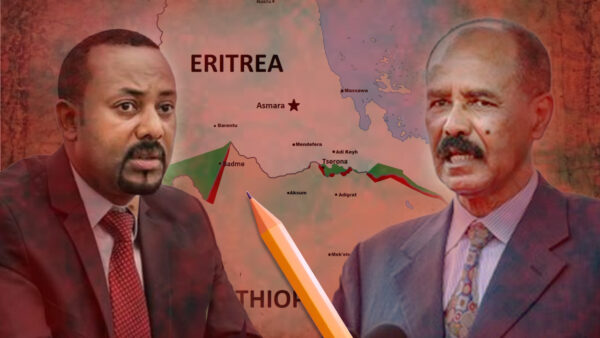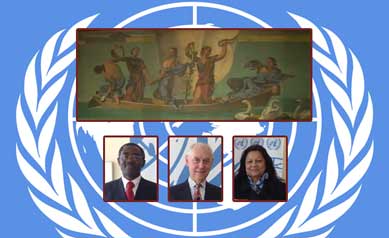Politics of Cynicism or Politics of Hope?
“Do we participate in a Politics of Cynicism or do we participate in a Politics of Hope?”
Finding the Trail towards Triumph for the Eritrean Opposition and People
“I am fundamentally an optimist. Whether that comes from nature or nurture, I cannot say. Part of being optimistic is keeping one’s head pointed toward the sun, one’s feet moving forward. There were many dark moments when my faith in humanity was sorely tested, but I would not and could not give myself up to despair. That way lays defeat and death.”
These are the words of a man, a leader, who was objected to severe injustice and humiliation during most of his life, yet he understood very well that he could not focus on all that was wrong if he wanted to succeed. Nelson Mandela was a freedom fighter who knew that a people’s struggle for justice, liberty, and peace could not be based on being against an unjust system and its evil henchmen, instead, the struggle–in order to survive and thrive–had to visibly aim for something positive.
“The secret of change is to focus all of your energy, not on fighting the old, but on building the new.” Said Socrates, and ”I have a dream….” was the message of Martin Luther King.
We are no Mandelas, Socrates-es, or Kings, but these leaders who questioned the existing state of affairs and who profoundly impacted on the value systems, behaviour, reactions, and ultimately achievements of entire societies, understood that the quest for change could only transpire if you did not dwell on what you did not have or did not want, but if instead, you clearly spelled out and confidently focused and worked towards what you wanted in its place. Effective progress towards your goals is built on that principle and Eritrea’s opposition for change needs to realize, comprehend, and follow that.
Three current key traits in the Eritrean Opposition that are counter-productive towards effective progress and success are:
1) Focusing on what you do not want
Here is an interesting fact: Our conscious mind only represented about 12% of total brain capacity, the remaining 88% are taken up by the subconscious mind (some of it being described as the unconscious mind). Our conscious mind can only hold one single thought at a time, while our unconscious mind acts like a massive computer that stores all information and experiences that we feed into it. This includes communication with others and all our thoughts. The unconscious mind then sends signals to the rest of our body resulting in our emotions, habits, and action steps, which drive us towards failure, stagnation, or success. So if you focus to a great extent on what you do not want (e.g. tyranny and torture), you are creating a negative context and your actions and results will align to that. In order to achieve and build something successfully (e.g. freedom and democracy) our subconscious minds need to be fed with positive goals to align our actions with our vision for a democratic Eritrea. Looking at the current ‘change seeker mindset’ among the Eritrean opposition and people there is an urgent need to make conscious decisions to propagate and spread empowering messages. This means that you do not primarily focus on the disaster on the ground, which creates a lot of negative energy (and most definitely weakens you!) but that you concentrate instead on what you will build in order to replace it. This creates confidence, faith, and positive energy enabling you to overcome challenges faster and more effectively.
2) Feeding our minds with negative affirmations
When we are awake we feed our mind with a flow of information and affirmations. Much of it is the quiet self-talk we do each minute of the day: We are worried that the economy is down, that we will lose our job even if we can barely stand it. We don’t like the car we are driving, we called a colleague who did not pick up, he probably ignored us. We watch the news about wars and terrorism, about poverty, failing economies and corrupt leaders.
When you are part of the Eritrean opposition the amount of negativity you inject into your mind each day can take on further extremes: Meetings, articles, Paltalk discussions, radio programs: we argue and discuss each other’s failings and shortages, we mistrust, we accuse, we defame, we boycott, we self-analyze. We lead a politics of cynicism more often than not!
We listen to the reports on betrayal and crimes committed by Higdef, we take in stories about the imprisoned, the impoverished, the tortured, the drowned, the shot, the family tragedies, the pain, the tears. Some talk about the uselessness of the liberation struggle into which we invested 30 years, others about the hopelessness of the opposition, or the ineffectiveness of the youth.
The result following the same mind-emotion-action pattern discussed above: you become what you think you are. Always in that order. Not the other way around. When we feed our mind (by choice) with certain thoughts and paradigms our subconscious mind then triggers the emotions that lead us to take action in accordance. Continuously negative food for the mind triggers negative emotions, and consequently leads to negative, weak or counterproductive habits, character traits, and steps. You remain stuck in the rot. If you are constantly told you are weak (especially by yourself!), you will believe it and become it. If we want to break this cycle in the Eritrean opposition we have to consciously change the paradigms, messages, and affirmations with which we feed our people’s mindset. This is a tiresome exercise in the beginning, but very achievable. And it gets easier with time if there is enough awareness and commitment.
3) Self-analysis with no end in sight
Let us use a quick example: You may have come to a conclusion that the weaknesses of your parents have resulted in a lack of confidence and motivation in you as an adult. The first step towards change is such an acknowledgement. Now, you can blame it on your parents, you can ignore it, or read and write article after article why you are failing as a result (possibly being cynical or feeling sorry for yourself) – or you can get up and decide that you will turn those past experiences and weaknesses around and not allow them to rule your future. Understanding your weak points is critical to set change into motion, but it is only of benefit, if you use it as a driving force to get out of the bleak current situation into a happier one. Otherwise, continuously analyzing the shortfalls of your past and presence (not letting go!) means to simply re-enforce your weaknesses, because you feed your mind repeatedly with information that is disapproving, and as a result, you remain stuck where you are or sink even deeper.
In the case of the Eritrean opposition the self-analysis years are still blooming. We enjoy reading articles about running around in a circular journey, with no end in sight – except for switching gears right into suicide mode – , we sarcastically regret that yet another organization split and that we cannot differentiate among the various organizational acronyms, we listen to the shortfalls of our liberation strugglers during the 70ies and 80ies and feel confident in concluding that it was all a set up and that the new generation suffers from the same bad mannerism of the older generation. Eritreans have sunk so deep, we welcome all communication that confirms that, yes, we deserve it, and every time we see failure it was really to be expected.
Self-image, expectations, and perceived reality of events are striking a balance and that predictability gives human beings security, even if the entire outlook is a negative one.
Higdef in the meanwhile conveys a message to the contrary. A message of a strong people with a proud history, a people characterized by self-reliance, confidence, invincibility, and unity. It spreads news about new roads, hospitals, agricultural projects, investment opportunities, development progress. Higdef has used a very powerful tool: a long-term propaganda strategy that makes people feel good about themselves, coupled with a positive outlook in the messages they are propagating. That builds self-validation, trust, hope, and security, so much so that it took us years and decades to realize that our people were lead by a group of power hungry, criminal thugs.
Now, the opposition has the moral high ground. It is standing up for justice and demands freedom, the rule of law, and democratic governance. Yet it propagates these wonderful values within a very negative context. Cynicism and depression cannot drive these positive values into reality, only self-confidence and hope can. If you look at various studies, for example in child development or entrepreneurship, you will find just that: the positive image we have of ‘self’ and how that is able to impact on the world around us, is the most powerful driver towards success. People who have a positive self-image become self-confident, happier, and more successful and that again improves their self-image even further. It’s a self-empowering cycle. Similarly, people with a negative self-image (created by the information and paradigms they let into their minds on a regular basis both by themselves and others) are less happy and usually less successful in what they set out to achieve, and each failure just re-enforces that negative self-image further. A circular journey indeed!
On the contrary, productive, confident, and optimistic thoughts trigger positive emotions, and as a result new potential and motivation can be unleashed within ourselves, a group, or a even a nation.
Many will remember the powerful speech ‘the Audacity of Hope’, which Barack Obama delivered at the Democratic Convention Center in Boston, Massachusetts, in 2004. While a Senate candidate for Illinois, Obama delivered a speech that inspired millions and catapulted him into fame and popularity over night. Here are his words:
“In the end, that’s what this election is about. Do we participate in a politics of cynicism or a politics of hope? (…) I’m not talking about blind optimism here — the almost willful ignorance that thinks unemployment will go away if we just don’t talk about it, or the health care crisis will solve itself if we just ignore it. No, I’m talking about something more substantial. It’s the hope of slaves sitting around a fire singing freedom songs; the hope of immigrants setting out for distant shores; (…) the hope of a millworker’s son who dares to defy the odds; the hope of a skinny kid with a funny name who believes that America has a place for him, too. Hope in the face of difficulty. Hope in the face of uncertainty. The audacity of hope! In the end, that is God’s greatest gift to us, the bedrock of this nation. A belief in things not seen. A belief that there are better days ahead.”
Obama’s speech was elaborated in detail in his book titled: ‘The Audacity of Hope: Thoughts on Reclaiming the American Dream’ (2006) which made it into several bestseller lists just a couple of months before Obama started his presidential campaign. In 2008, the unexpected happened: A black man was elected President of the United States of America. Many analysts believe that Obama’s 2004 speech and message of hope won him the presidency against all odds.
This just shows how powerful ‘hope’ can be as a political instrument, as it means to replace the old with something worthy. The moment people believe it is possible and achievable the days of the old system are counted. But not only that, you also form a new beginning with a healthy basis guided by positive goals and expectations rather than by fear or uncertainty of what will follow when the old is gone.
Hope–not in the form of wishful thinking but the shape of strong faith–is indeed the decisive factor between failure and thriving success and yes, often between death and survival.
Dr. Dale Archer, an American clinical psychiatrist and bestselling author who studied the concept of ‘hope’ said: “As long as a patient, individual or victim has hope, they can recover from anything and everything. However if they lose hope, unless you can help them get it back, all is lost.” ‘Hope turns cancer patients and survivors of trauma into fighters rather than victims.
“…I would not and could not give myself up to despair. That way lays defeat and death.” Said Neslon Mandela
“I have a dream…” Said Martin Luther King.
“Hope in the face of difficulty. Hope in the face of uncertainty. The audacity of hope!” Said Barack Obama
Reviving the Eritrean Dream with a Politics of Hope
As the year comes to an end, it is a perfect time to reflect and decide to let go of old habits, views, and messages and to engage in new ones. If you always do the things the way you have done them in the past, you will get the same results. If you want change, you need to do things differently. In the Eritrean opposition that means to grow out of politics and activism largely characterized by cynicism and depression and embrace a new chapter: leading and mainstreaming a ‘Politics of Hope’.
But let’s be honest: it is not done with short-lived euphoria following new campaigns or accomplishments. It is not done with a few well-meant articles, slogans, or compliments. And of course it will not be achieved because we like attractive resolutions for a new year, after all, old habits die hard.
But it can be accomplished if leaders, authors, broadcasters, you and me consciously (or very consciously) engage in a Politics of Hope.
So how would that look like?
We need to create a vivid and attractive vision for a future democratic Eritrea towards which we strive with conviction and confidence. How wide fetched that vision may seem at this point, is not the question. Important is that we have a powerful and positive visualization that builds an empowering context for all our undertakings. We need to be part of a shift in thinking and build new messages of hope that resonate in the minds of almost every Eritrean. It will not happen overnight, but a new chapter of a ‘Politics of Hope’ is what the Eritrean people need in their quest towards a free and democratic country.
So instead of self-analyzing, focusing on our weaknesses, and tirelessly reporting about the brutality of the regime currently in power let’s shift the balance. Let’s identify ways of how to empower pro-democratic progress inside Eritrea. Let’s discuss the building blocks of democracy. Let’s review and promote Eritrea’s constitution. Let’s draw plans for a transitional period. Let’s engage with foreign diplomats. Let’s educate about confidence building. Let’s understand the psychological concepts of hope and success. Let’s share examples of good leadership initiatives. Let’s draft possible development policies for a new Eritrea. Let’s actively promote and empower women in this struggle. Let’s celebrate our cultures and diversity as a basis for peace and common understanding post-Higdef. Let’s share stories of inspiring achievements, let’s promote Eritrean talents, let’s share reports about rising prosperity and modernity in many parts of Africa as an example for our people’s dreams and ambitions.
Hope in the face of difficulty. Hope in the face of uncertainty. The audacity of hope! The hope of a people who are prepared to turn their nightmare into a story of great achievement and happiness. Because despite the tragic setbacks, the Eritrean people very much have what it takes: our people have proven many times their great potential for solidarity, adaptation, creativity, self-confidence, discipline, bravery, patience, love, and hard work. A newly found awareness and strong sense of hope and faith will unleash all of it once more!




Awate Forum